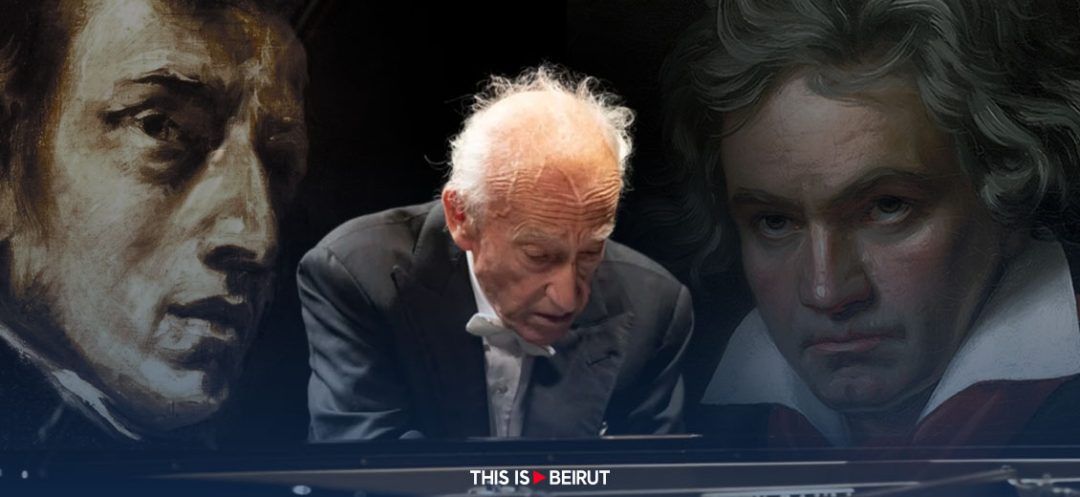
Like a star that slowly dies out in silence, Maurizio Pollini went on to join his peers in supreme Harmony. Dominique Merlet, Gilles Cantagrel and Bernard Fournier pay tribute to an exceptional artist.
And the candle goes out. The silence thickens, densifies and becomes heavy with grief, sorrow and pain. Solemnly engulfing this eternal moment, the overwhelming silence recounts the final steps of an artist who, to a mellow death knell, has become one with the ultimate truth. Maurizio Pollini has spread his wings to penetrate the realm of the infinite and add – like many artists before him – “constellation to eternity,” to quote the poet Alain Tasso who wrote about the exegesis of the breath. Thus, the last droplets of the morning dew evaporate, as the classical music scene sinks ever deeper into an increasingly barren desert. But in this silence surrounding Pollini’s departure, the masterpieces he gave birth to will always serve as consolation for souls in quest of beauty, emotion and music first and foremost, in a dehumanized world.
Maurizio Pollini was hailed as one of the twentieth century’s most legendary pianists. His incomparable dexterity, mastery of the cantabile art, natural flair for spacing, and his lyricism – both nuanced and carefully pondered, away from superfluous sentimentalism – made him one of the most respected and admired pianists of his generation. His highly eclectic interpretative approach highlights his profound artistic sensitivity, nullifying unfair accusations of cold and detached intellectualism. Beyond mere technical mastery, Pollini’s pianistic skills show absolute finesse. His virtuosity does not only serve music, it becomes music itself, bringing about a fluid and coherent storyline with an infinite array of colours and nuances.
Born in Milan in 1942, the Italian pianist gained notoriety as early as 1957, at the age of only fifteen, when he became finalist at the prestigious Geneva International Music Competition, alongside Martha Argerich and Dominique Merlet. But the competition was a tie, and the first prize was given to both Argerich and Merlet. Interviewed by This Is Beirut, Dominique Merlet stated, “Unfortunately, I have very few comments to make about this famous 1957 competition, as I have kept myself at a safe distance from all rumors – even the good ones – spread behind the scenes.” However, the 86 year-old pianist, who was awarded the first prize in the male section, expressed “great surprise” over the decision, all while highlighting his pleasure to see the “astonishing” Martha Argerich. Sentimental, Merlet did not hide his grief over Maurizio Pollini, his “incomparable colleague,” “I admire his high musical stature greatly, and I think his passing is an enormous loss for the musical world.”
In 1960, Pollini excelled at the International Chopin Piano Competition in Warsaw and won the first prize. Nadia Boulanger, Heinrich Neuhaus and Arthur Rubinstein – whose reputation gave even more resonance to this historic win – were among the jury members. “I recall what the great Arthur Rubinstein, one of the jury members for the Chopin competition in Warsaw in 1960, told me and his colleagues Emil Gilels, Sviatoslav Richter and Arturo Benedetti Michelangeli, when he said ‘This young man already plays better than any of us!’,” explains the seasoned musicologist Gilles Cantagrel, a Bach specialist and the former director of France Musique, to This Is Beirut. Cantagrel added that candidates had to choose between three proposed Chopin études and that, when asked which one he wanted, Pollini simply replied, “any.” And while other competitors were working “like ants,” Maurizio Pollini was busy solving chess problems.
The early discovery of Pollini’s pianistic genius would mark the beginning of an exceptional career, strewn with critically acclaimed pieces, including his masterful and referential interpretations of Chopin’s work. “He was, to me, more than a great performer. When he played Chopin’s Preludes, Études, Ballades, it was no interpretation, no matter how beautiful and transcendent it was, it was poetry, effortless poetry,” Gilles Cantagrel states with a great deal of nostalgia. Cantagrel adds, “Listen to his rendition of Chopin’s twelve Études on CD. As ungrateful as it might sound, this is no piano playing, this is no exercise, this is an integral part of some intense poetry, an adventure of the spirit.” According Gilles Cantagrel, Pollini’s interpretations took the audience on a journey where elegance mingled with shifting lights, punctuated by episodes of drama, mirth, heroism and oniric contemplation. “The feeling is amplified when you listen to his music live, in a concert hall,” he remarked.
Pollini’s adamancy, devotion and quasi-religious attitude towards the integrity of the musical work bore witness to a great subtlety, one that is becoming increasingly rare in the contemporary music scene. He often said that “dissociating the technical and musical aspects of an interpretation is impossible, because technique goes well beyond precision.” In reference to Alfred Cortot’s approach – which contrasted highly with his – Pollini stressed that “a master’s imagination shows through their fantastic technique.” This is, indeed one of the remarkable aspects of the Italian pianist’s career: his sources of inspiration were as diverse as his repertoire, ranging from Johann Sebastian Bach, to Wolfgang Amadeus Mozart, Ludwig van Beethoven, Frédéric Chopin and Claude Debussy, and from Béla Bartók, to Pierre Boulez, Luigi Nono and Karlheinz Stockhausen. Hence the challenge of classifying him within a particular school or tradition. Despite having studied under Carlo Lonati, Carlo Vidusso and Arturo Benedetti Michelangeli, Pollini never perceived himself as a mere disciple, but rather as an artist at the service of the great composers he held in high esteem.
“In my opinion, Pollini was more Beethovenian than Chopinian. To me, the greatest Chopinian pianist was Heinrich Neuhaus.” Dominique Merlet’s statement seems to corroborate the opinion of Bernard Fournier’s, a famous Beethoven specialist. “I heard him play Bach, Mozart, Schubert, Schumann, Brahms, Chopin, Schoenberg and Nono, among others, and each time, it was a miracle of beauty and grandeur. But it was when he interpreted Beethoven – his last five sonatas, more specifically – that he brought me the greatest musical, artistic, and, let’s admit it, human joy,” the French musicologist insisted in his interview with This Is Beirut. Merlet added that Pollini had, well above everyone else, the gift of communicating the energy and depth of music, but also its tenderness and generosity. “He knew how to make the audience understand the extreme complexity of some compositions (the Hammerklavier fugue) and how to enable the soul to vibrate with emotion and affection to the sound of the great adagios,” he concluded.
Maurizio Pollini is, according to Bernard Fournier, “in complete fusion with the art in which, like no other, ‘logical thought’ and ‘affective thought’ mingle, to quote the great Musil.” His natural penchant for artistic excellence and humble devotion for music are a lesson to be taught to any musician in search of perfection. “It seems to me that young pianists play too fast and too ‘hard’. But maybe, one day, we will have the long-awaited revelation? It is my utmost wish! Let us hope for a new golden age,” stated the French virtuoso pianist.
One can think of no one other than Gilles Cantagrel to conclude this article with: “After Luigi Nono and Claudio Abbado, his long time friends, our marvelous storyteller has breathed his last sigh: what sadness!” Riposa in pace, Maestro.
And the candle goes out. The silence thickens, densifies and becomes heavy with grief, sorrow and pain. Solemnly engulfing this eternal moment, the overwhelming silence recounts the final steps of an artist who, to a mellow death knell, has become one with the ultimate truth. Maurizio Pollini has spread his wings to penetrate the realm of the infinite and add – like many artists before him – “constellation to eternity,” to quote the poet Alain Tasso who wrote about the exegesis of the breath. Thus, the last droplets of the morning dew evaporate, as the classical music scene sinks ever deeper into an increasingly barren desert. But in this silence surrounding Pollini’s departure, the masterpieces he gave birth to will always serve as consolation for souls in quest of beauty, emotion and music first and foremost, in a dehumanized world.
Nuanced Lyricism
Maurizio Pollini was hailed as one of the twentieth century’s most legendary pianists. His incomparable dexterity, mastery of the cantabile art, natural flair for spacing, and his lyricism – both nuanced and carefully pondered, away from superfluous sentimentalism – made him one of the most respected and admired pianists of his generation. His highly eclectic interpretative approach highlights his profound artistic sensitivity, nullifying unfair accusations of cold and detached intellectualism. Beyond mere technical mastery, Pollini’s pianistic skills show absolute finesse. His virtuosity does not only serve music, it becomes music itself, bringing about a fluid and coherent storyline with an infinite array of colours and nuances.
High Musical Stature
Born in Milan in 1942, the Italian pianist gained notoriety as early as 1957, at the age of only fifteen, when he became finalist at the prestigious Geneva International Music Competition, alongside Martha Argerich and Dominique Merlet. But the competition was a tie, and the first prize was given to both Argerich and Merlet. Interviewed by This Is Beirut, Dominique Merlet stated, “Unfortunately, I have very few comments to make about this famous 1957 competition, as I have kept myself at a safe distance from all rumors – even the good ones – spread behind the scenes.” However, the 86 year-old pianist, who was awarded the first prize in the male section, expressed “great surprise” over the decision, all while highlighting his pleasure to see the “astonishing” Martha Argerich. Sentimental, Merlet did not hide his grief over Maurizio Pollini, his “incomparable colleague,” “I admire his high musical stature greatly, and I think his passing is an enormous loss for the musical world.”
A Historic Win
In 1960, Pollini excelled at the International Chopin Piano Competition in Warsaw and won the first prize. Nadia Boulanger, Heinrich Neuhaus and Arthur Rubinstein – whose reputation gave even more resonance to this historic win – were among the jury members. “I recall what the great Arthur Rubinstein, one of the jury members for the Chopin competition in Warsaw in 1960, told me and his colleagues Emil Gilels, Sviatoslav Richter and Arturo Benedetti Michelangeli, when he said ‘This young man already plays better than any of us!’,” explains the seasoned musicologist Gilles Cantagrel, a Bach specialist and the former director of France Musique, to This Is Beirut. Cantagrel added that candidates had to choose between three proposed Chopin études and that, when asked which one he wanted, Pollini simply replied, “any.” And while other competitors were working “like ants,” Maurizio Pollini was busy solving chess problems.
An Adventure of the Spirit
The early discovery of Pollini’s pianistic genius would mark the beginning of an exceptional career, strewn with critically acclaimed pieces, including his masterful and referential interpretations of Chopin’s work. “He was, to me, more than a great performer. When he played Chopin’s Preludes, Études, Ballades, it was no interpretation, no matter how beautiful and transcendent it was, it was poetry, effortless poetry,” Gilles Cantagrel states with a great deal of nostalgia. Cantagrel adds, “Listen to his rendition of Chopin’s twelve Études on CD. As ungrateful as it might sound, this is no piano playing, this is no exercise, this is an integral part of some intense poetry, an adventure of the spirit.” According Gilles Cantagrel, Pollini’s interpretations took the audience on a journey where elegance mingled with shifting lights, punctuated by episodes of drama, mirth, heroism and oniric contemplation. “The feeling is amplified when you listen to his music live, in a concert hall,” he remarked.
An Almost Religious Attitude
Pollini’s adamancy, devotion and quasi-religious attitude towards the integrity of the musical work bore witness to a great subtlety, one that is becoming increasingly rare in the contemporary music scene. He often said that “dissociating the technical and musical aspects of an interpretation is impossible, because technique goes well beyond precision.” In reference to Alfred Cortot’s approach – which contrasted highly with his – Pollini stressed that “a master’s imagination shows through their fantastic technique.” This is, indeed one of the remarkable aspects of the Italian pianist’s career: his sources of inspiration were as diverse as his repertoire, ranging from Johann Sebastian Bach, to Wolfgang Amadeus Mozart, Ludwig van Beethoven, Frédéric Chopin and Claude Debussy, and from Béla Bartók, to Pierre Boulez, Luigi Nono and Karlheinz Stockhausen. Hence the challenge of classifying him within a particular school or tradition. Despite having studied under Carlo Lonati, Carlo Vidusso and Arturo Benedetti Michelangeli, Pollini never perceived himself as a mere disciple, but rather as an artist at the service of the great composers he held in high esteem.
Beethovenian or Chopinian?
“In my opinion, Pollini was more Beethovenian than Chopinian. To me, the greatest Chopinian pianist was Heinrich Neuhaus.” Dominique Merlet’s statement seems to corroborate the opinion of Bernard Fournier’s, a famous Beethoven specialist. “I heard him play Bach, Mozart, Schubert, Schumann, Brahms, Chopin, Schoenberg and Nono, among others, and each time, it was a miracle of beauty and grandeur. But it was when he interpreted Beethoven – his last five sonatas, more specifically – that he brought me the greatest musical, artistic, and, let’s admit it, human joy,” the French musicologist insisted in his interview with This Is Beirut. Merlet added that Pollini had, well above everyone else, the gift of communicating the energy and depth of music, but also its tenderness and generosity. “He knew how to make the audience understand the extreme complexity of some compositions (the Hammerklavier fugue) and how to enable the soul to vibrate with emotion and affection to the sound of the great adagios,” he concluded.
Maurizio Pollini is, according to Bernard Fournier, “in complete fusion with the art in which, like no other, ‘logical thought’ and ‘affective thought’ mingle, to quote the great Musil.” His natural penchant for artistic excellence and humble devotion for music are a lesson to be taught to any musician in search of perfection. “It seems to me that young pianists play too fast and too ‘hard’. But maybe, one day, we will have the long-awaited revelation? It is my utmost wish! Let us hope for a new golden age,” stated the French virtuoso pianist.
One can think of no one other than Gilles Cantagrel to conclude this article with: “After Luigi Nono and Claudio Abbado, his long time friends, our marvelous storyteller has breathed his last sigh: what sadness!” Riposa in pace, Maestro.
Read more




Comments